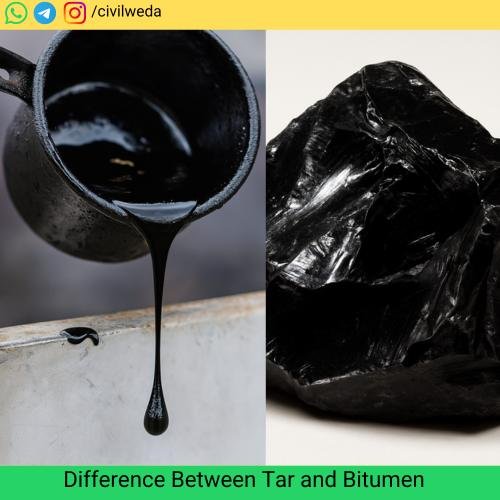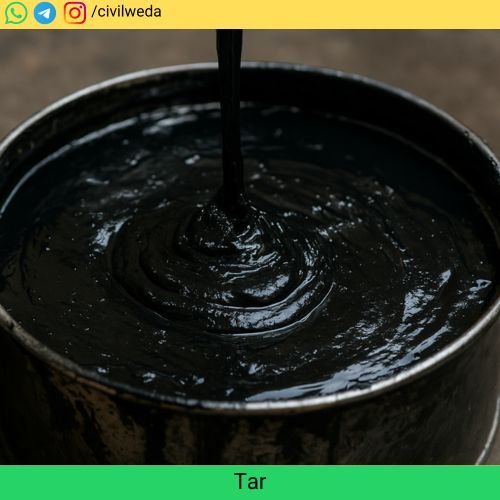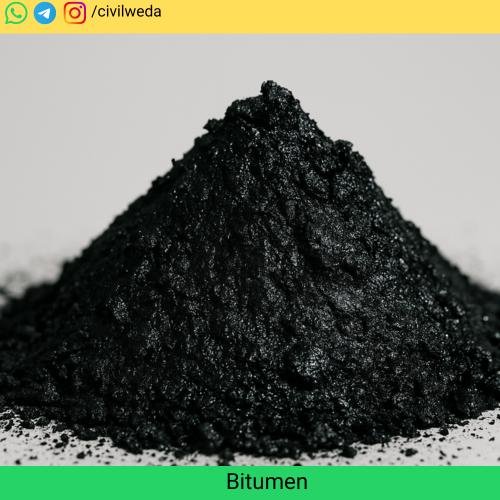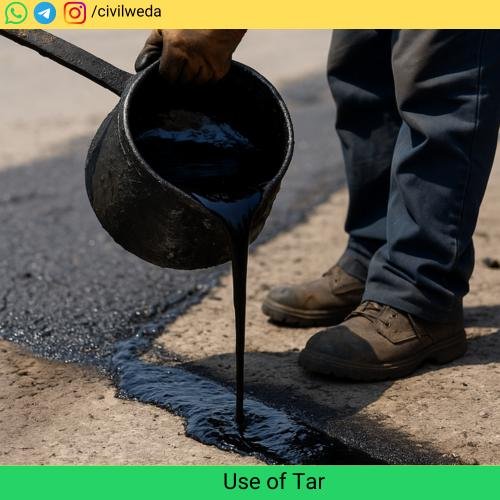Introduction

The difference Between Tar and Bitumen is one of the most common topics in civil engineering and road construction. At first, both materials look similar—black, sticky, and used as binders in pavement works. But in reality, their origin, properties, durability, and applications are completely different.
Tar is produced by the destructive distillation of coal or wood and was widely used in earlier road construction projects. In contrast, Bitumen is derived from petroleum refining and has become the standard material in modern road works due to its strength, flexibility, and safety.
In this ultimate guide, we will clearly explain the key differences between Tar and Bitumen, their properties, uses, and why Bitumen has replaced Tar in almost all civil engineering applications. Don’t forget to read our other article: A Complete Guide on Bitumen. Let’s Start-
What is Tar?

When we study the difference between Tar and Bitumen, the first step is to understand what Tar actually is. Tar is a black, thick, and sticky material obtained through the destructive distillation of coal, wood, or oil. Earlier, it was widely used in road construction and waterproofing, but due to health hazards and lower durability, its use has almost disappeared in modern construction works.
Properties of Tar
- Produced from coal, wood, or oil distillation
- Dark brown to black in color with a pungent odor
- Lower softening point, not suitable for hot climates
- Becomes brittle in cold conditions
- Contains carcinogenic compounds (harmful to health)
- Less durable compared to Bitumen
Uses of Tar
- Historically used in road construction and paving
- Waterproofing of roofs, basements, and foundations
- Protective coating for timber and metal structures
- Limited applications today, as Bitumen is preferred in almost all cases
What is Bitumen?

To clearly understand the difference between Tar and Bitumen, it is important to define Bitumen. Bitumen is a black, sticky, and highly viscous material obtained as a by-product of petroleum refining. Unlike Tar, Bitumen is safer, more durable, and has become the most widely used material in road construction and civil engineering projects.
Properties of Bitumen
- Obtained during the refining of petroleum.
- Dark black in color with a mild smell.
- Higher softening point, suitable for hot climates.
- Excellent binding capacity with aggregates.
- Waterproof, durable, and flexible in different weather conditions.
- Comparatively safe to handle and non-carcinogenic.
Uses of Bitumen
- Widely used in road construction (asphalt concrete, bituminous macadam).
- Roofing and waterproofing works.
- Protective coating for structures.
- Industrial applications such as sealing, insulation, and paints.
Difference Between Tar and Bitumen
The most important difference between Tar and Bitumen is in their origin, durability, safety, and current applications. Although both materials look similar, their performance in road construction is very different. In modern civil engineering, the Difference Between Tar and Bitumen helps us understand why Bitumen has replaced Tar almost completely.
| Parameter | Tar | Bitumen |
|---|---|---|
| Source | Less durable, brittle in cold weather, softens quickly in a hot climate. | Obtained as a by-product during petroleum refining. |
| Color & Smell | Dark brown to black, strong and pungent odor. | Deep black in color, mild smell. |
| Durability | Contains carcinogenic compounds, harmful to workers. | Highly durable, flexible in all climates, resistant to ageing. |
| Softening Point | Lower softening point, unsuitable for tropical regions. | Higher softening point, suitable for both hot and cold climates. |
| Water Resistance | Limited water-resistant properties. | Excellent waterproofing ability. |
| Solubility | Partially soluble in benzene (C6H6), toluene (C₆H₅CH₃ (ya C₇H₈)), and other organic solvents. | Completely soluble in carbon disulfide (CS2) and Carbon tetrachloride (CCl4). |
| Health Impact | Easily available as a petroleum by-product, cost-effective. | Comparatively safe, non-carcinogenic. |
| Workability | Difficult to handle due to smell and stickiness. | Easy to handle and widely accepted in construction. |
| Cost & Availability | Less economical and less available in present times. | Easily available as petroleum by-product, cost-effective. |
| Current Use | Rarely used today in road works and waterproofing. | Widely used in road construction, roofing, and industrial applications. |
Advantages of Bitumen over Tar


When we analyze the difference between Tar and Bitumen, it becomes clear that Bitumen is far superior in terms of performance, safety, and availability. This is the reason why Bitumen has completely replaced Tar in modern road construction.
- Durability:
Bitumen has a higher softening point and better flexibility, which makes it long-lasting and suitable for different climates. - Safety:
Unlike Tar, which contains carcinogenic compounds harmful to health, Bitumen is comparatively safe for workers and the environment. - Workability:
Bitumen is easy to handle, transport, and apply in road works, while Tar has a strong odor and sticky nature, making it difficult to use. - Waterproofing:
Bitumen provides excellent resistance to water, making it ideal for road surfaces, roofing, and sealing works. - Availability & Economy:
Bitumen is easily available as a by-product of petroleum refining, making it more economical compared to Tar. - Versatility:
It is not only used in highways but also in roofing, waterproofing, paints, and industrial applications.
Read more Civil Engg topics
- Chlorination of water
- Difference between bitumen and tar
- Pile foundation
- Drip Irrigation
- Viscosity
- Surface Tension
- Instrument used in a chain survey
- Fillet Weld
- Bulking of sand
- Cement
Conclusion
The difference between Tar and Bitumen lies in their source, durability, safety, and present-day applications. Tar, obtained from coal or wood distillation, was once used in road construction and waterproofing. However, due to its low durability and harmful health effects, its usage has almost disappeared.
On the other hand, Bitumen, derived from petroleum refining, has become the most reliable and widely used material in civil engineering. With its excellent durability, water resistance, safety, and easy availability, Bitumen is the preferred choice in modern road construction, roofing, and industrial works.
👉 In short, Tar has been replaced by Bitumen in almost all engineering applications, proving why Bitumen is superior in performance and practicality.
If you found this guide useful, don’t miss our detailed article on Bitumen.
FAQs on Tar and Bitumen
Q1. What is the main difference between Tar and Bitumen?
The main difference is in their source. Tar is obtained from the distillation of coal or wood, while Bitumen is derived from petroleum refining. Bitumen is more durable and safer, which is why it is widely used in modern road construction.
Q2. Why is Tar not used in road construction today?
Tar is not used today because it contains carcinogenic compounds, has a strong odor, and is less durable compared to Bitumen. Health and environmental concerns have almost eliminated its use.
Q3. Which is better: Tar or Bitumen?
Bitumen is better because it is long-lasting, flexible, waterproof, and comparatively safe to handle. It has replaced Tar in almost all civil engineering applications.
Q4. What are the main uses of Bitumen?
Bitumen is mainly used in road construction, roofing, waterproofing, paints, and sealing applications. Its durability and water resistance make it highly versatile.
Q5. Is Bitumen soluble in water?
No, Bitumen is insoluble in water. However, it is completely soluble in organic solvents like carbon disulfide, benzene, and toluene.
Thank You for Reading! 🙏
We hope this article helped you clearly understand the difference between Tar and Bitumen, along with their properties, uses, and applications in civil engineering. If you found this guide useful, please share it with your friends and University students. For more informative posts on civil engineering topics, stay connected with Civil Weda. 🚀


